|
|
|
Sort Order |
|
|
|
Items / Page
|
|
|
|
|
|
|
| Srl | Item |
| 1 |
ID:
095638


|
|
|
|
|
| Publication |
2010.
|
| Summary/Abstract |
This article evaluates state-sponsored terrorism as a principal-agent issue. More often applied to the study of licit national or international institutions as a way to improve their governance, we argue that applying principal-agent analysis to illicit relationships such as those between states and terrorist agents is an equally fruitful application, though one with different objectives. Rather than being used as a tool to improve governance, applying principal-agent analysis to illicit relationships such as state-sponsored terrorism may point to areas of susceptibility and thus inform more effective counterterrorism strategies. In this article, we explain why states delegate to terrorist groups, how they seek to control their agents, and the tensions in the relationship, both generally and through specific reference to Iran's sponsorship of Hizballah, Syria of various Palestinian groups, and the Taliban of al-Qa'ida. This analysis yields propositions about the conditions under which states are likely to delegate to terrorist groups and specific recommendations on how principal-agent problems of these illicit relationships may be used in practice to combat terrorism.
|
|
|
|
|
|
|
|
|
|
|
|
|
|
|
|
| 2 |
ID:
162063
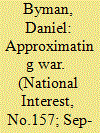

|
|
|
| 3 |
ID:
085116
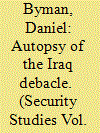

|
|
|
|
|
| Publication |
2008.
|
| Summary/Abstract |
This article examines whether the outbreak of an insurgency after the U.S. invasion of Iraq was an avoidable policy failure or whether the structural conditions surrounding the occupation made such an outbreak inevitable. Several U.S. policy mistakes, in particular the deployment of too few troops, a lack of comprehensive political and military planning for the occupation, disbanding the Iraqi military, the failure to establish a government in waiting, and overly aggressive de-Baathification, greatly exacerbated rather than ameliorated the various structural problems. More fundamentally, structure and policy choices interacted at all levels to explain the Iraq failure. The unavoidable conditions that coalition forces encountered in Iraq-a divided society devastated by years of war, sanctions, and misrule-and the political context in the United States made the challenge for successful policy execution difficult. This structure constrained and delimited the options open to U.S. policy makers but, even within those narrow limits, the United States made many bad choices that further diminished the chances of success.
A particularly important series of policy mistakes occurred well in advance of the buildup to war itself. The orientation of the U.S. armed forces away from counterinsurgency, the failure to establish a political settlement before invasion, and other controllable policy choices in the prewar period all led to enormous difficulties during the occupation itself. Thus, by the time of the invasion, these policy choices had become almost like structural constraints and the failures had a snowballing effect, making policy corrections far more difficult.
|
|
|
|
|
|
|
|
|
|
|
|
|
|
|
|
| 4 |
ID:
141545
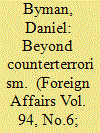

|
|
|
|
|
| Summary/Abstract |
When the Obama administration looks at the Middle East [2], it does so through the lens of counterterrorism. A systematic emphasis on the subject has underscored not just the administration’s relentless pursuit of al Qaeda and its new focus on the self-proclaimed Islamic State [3] (or ISIS) but also a wider swath of its foreign policy, from its drone campaign in northwestern Pakistan to its maintenance of the detention facility in Guantánamo Bay.
|
|
|
|
|
|
|
|
|
|
|
|
|
|
|
|
| 5 |
ID:
073804


|
|
|
|
|
| Publication |
2006.
|
| Summary/Abstract |
The United States and Europe face different threats from Islamist terrorism, have different perceptions of even their common threats, have different tools for fighting terrorism, and respond differently. An inability to cooperate, however, may result in attacks or economic disruption.
|
|
|
|
|
|
|
|
|
|
|
|
|
|
|
|
| 6 |
ID:
134004
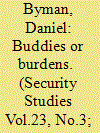

|
|
|
|
|
| Publication |
2014.
|
| Summary/Abstract |
Drawing on organization theory, this article argues that al Qaeda seeks affiliates to expand the scope and scale of its operations, gain the benefits of greater local expertise, better spread innovations, and?most important?endow itself and its mission with greater legitimacy. The conventional wisdom on al Qaeda affiliates emphasizes these benefits and thus paints affiliation as a tremendous boon to al Qaeda that magnifies the danger of terrorism. However, al Qaeda faces a host of problems related to delegation and integration, and often affiliation is a net loss. Divergent preferences and priorities, branding problems, shirking at the local level, adverse selection, and costly control mechanisms all make affiliates of questionable value to the core organization. Although the danger al Qaeda poses may have morphed with the core declining and the affiliates rising in importance, the broader movement is probably less dangerous than it was when the al Qaeda core was at its height. US counterterrorism often magnifies these integration problems and, if done well, can further induce friction, discredit the brand, and otherwise throw sand in the gears. The broader study of al Qaeda and its affiliates also offers insight into the study of organizations in general.
|
|
|
|
|
|
|
|
|
|
|
|
|
|
|
|
| 7 |
ID:
065656


|
|
|
|
|
| Publication |
1998.
|
| Description |
p.127-151
|
|
|
|
|
|
|
|
|
|
|
|
|
|
|
|
| 8 |
ID:
157206
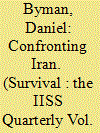

|
|
|
|
|
| Summary/Abstract |
Iran continues to sponsor a range of militant groups and has the capacity to conduct international terrorism – a problem that has bedevilled US administrations and the international community since the 1979 Islamic Revolution. Iranian terrorism is primarily a threat to US interests and allies in the Middle East: Tehran’s activities worsen civil wars and contribute to the destabilisation of the region. The threat to the US homeland and to Europe, however, remains latent, with Iran using its terrorism capability to deter Western actions and as a contingency should the United States attack Iran.
|
|
|
|
|
|
|
|
|
|
|
|
|
|
|
|
| 9 |
ID:
062280
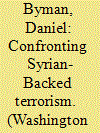

|
|
|
| 10 |
ID:
056210
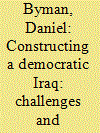

|
|
|
| 11 |
ID:
052682
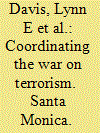

|
|
|
|
|
| Publication |
Santa Monica, Rand Corporation, 2004.
|
| Description |
v, 15p.
|
|
|
|
|
|
|
|
|
|
|
|
Copies: C:1/I:0,R:0,Q:0
Circulation
| Accession# | Call# | Current Location | Status | Policy | Location |
| 048302 | 363.320973/DAV 048302 | Main | On Shelf | General | |
|
|
|
|
| 12 |
ID:
066735


|
|
|
| 13 |
ID:
116345


|
|
|
|
|
| Publication |
2012.
|
| Summary/Abstract |
The article examines Israel's successes and failures during the Second Intifada. It argues that Israel's advances came from an effective counterterrorism campaign involving a mix of military operations, defensive measures, and in particular improved intelligence gathering. Domestic resilience also proved strong in the face of a brutal terrorism campaign. Yet long-term victory remains elusive for Israel. Deterrence, always difficult against terrorist groups, is growing harder for Israel. Hamas's control of Gaza, and the mistrust and hatred sown during the Second Intifada, have hindered a political deal between Israel and moderate Palestinians. Much of what went into successful counterterrorism, notably the security barrier and the aggressive campaign of raids and arrests, does not jibe with most visions of what peace would look like and makes a deal harder to achieve. To make a peace deal work, Israeli counterterrorism must change, with measures including relocating parts of the security barrier, bolstering moderate Palestinian politicians, and working with, as opposed to undermining, Palestinian security forces in the West Bank.
|
|
|
|
|
|
|
|
|
|
|
|
|
|
|
|
| 14 |
ID:
074978
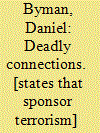

|
|
|
|
|
| Publication |
Cambridge, Cambridge University Press, 2005.
|
| Description |
xi, 369p.
|
| Standard Number |
0521839734
|
|
|
|
|
|
|
|
|
|
|
|
Copies: C:1/I:0,R:0,Q:0
Circulation
| Accession# | Call# | Current Location | Status | Policy | Location |
| 051910 | 327.117/BYM 051910 | Main | On Shelf | General | |
|
|
|
|
| 15 |
ID:
143636
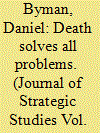

|
|
|
|
|
| Summary/Abstract |
Authoritarian states are often surprisingly successful counterinsurgents. In particular, authoritarians often repress on a vast scale and inhibit insurgent organization, transfer populations, have excellent intelligence penetration, and can counter war weariness in ways not available to democracies. Authoritarians, however, come to counterinsurgency with many disadvantages. They cannot rely on many of their conscripts. Corruption creates numerous problems, and authoritarian system often inhibits learning. Similarly, the politicized command structure often produces poor officers and discourages initiative. The repression they use often makes future unrest more likely. Finally, authoritarian regimes may find it harder to cut peace deals and win over pro-insurgent populations.
|
|
|
|
|
|
|
|
|
|
|
|
|
|
|
|
| 16 |
ID:
072121


|
|
|
|
|
| Publication |
2006.
|
| Summary/Abstract |
Governments have many means to begin a dialogue with terrorist groups. The offer of talks may lead terrorists' constituents to reduce their support for violence, and moderates within a group itself may also turn away from violence. Despite these potential benefits, even the consideration of entering discussions carries many risks. Talks with U.S. officials do indeed reward the use of terrorism, tangibly demonstrating that groups can kill innocents and yet become legitimate interlocutors-a reward that is costly both in terms of reducing the prevalence of this tactic worldwide and because it inevitably angers local allies fighting the groups. Moreover, talks often fail in a variety of ways, giving the terrorists a breathing space to rearm and organize and leaving the government looking foolish. Because talks often fail, policymakers should carefully explore whether the conditions are right for any hope of success before they begin a dialogue.
|
|
|
|
|
|
|
|
|
|
|
|
|
|
|
|
| 17 |
ID:
123198


|
|
|
|
|
| Publication |
2013.
|
| Summary/Abstract |
THE GROWING instability in Egypt's Sinai Peninsula represents one of the most dangerous, and most anticipated, crises in the Middle East. Even before the 2011 Egyptian revolution, the security vacuum in the Sinai allowed criminals and terrorists, including those with an ideology akin to Al Qaeda's, to expand their operations. In the chaos after the revolution, these problems have worsened. Meanwhile, various Palestinian groups use the Sinai as a launching pad for attacks against Israel.
|
|
|
|
|
|
|
|
|
|
|
|
|
|
|
|
| 18 |
ID:
065610


|
|
|
| 19 |
ID:
193069
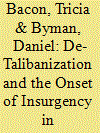

|
|
|
|
|
| Summary/Abstract |
This article examines the reasons for the rise of the Taliban and the onset of the insurgency in Afghanistan after the 2001 U.S. invasion, using counterfactual and path dependence analysis to bolster its arguments. We argue that the U.S. decision to de-Talibanize was a critical juncture, after which the rise of insurgency was far harder to prevent. The total rejection of the Taliban translated into the under-representation of Pashtuns in the Afghan government, delivering power to ethnic minorities at their expense. De-Talibanization led the United States to support strongmen to hunt the Taliban, but they were predatory, creating grievances that the Taliban exploited to recruit. Finally, de-Talibanization led many Taliban to flee to Pakistan, pushing them into the country most opposed to Afghanistan new political order. The lessons of the U.S. experience in Afghanistan suggest the necessity of a strategy for managing defeated enemies after an initial military victory.
|
|
|
|
|
|
|
|
|
|
|
|
|
|
|
|
| 20 |
ID:
077816


|
|
|
|
|
|
|
|